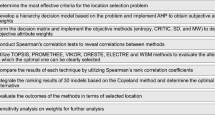Abstract
In recent years an avalanche of literature has been published in the field of multiple criteria analysis. This methodology for decision-making and evaluation serves to find the best compromise solutions among alternative choice options, taking into account the existence of conflicting judgment criteria.
The present paper focuses attention on one particular class of multiple criteria methods, viz. those in which the available information (impacts and policy priorities) is measured in an ordinal sense. This low level of measurement precludes the application of standard numerical methods. For this problem a new method, the so-called regime analysis, is devised in the paper.
This method is based on a pairwise comparison of choice options and serves to find the best available compromise by identifying that option which ensures the highest score probability that is embodied in the ordinal information. The formal derivation is based upon the principle of insufficient reasoning and leads in general to an unambiguous choice. Particular attention is also given to the existence of ties and of mixed (i.e. qualitative-quantitative) information.
The method is illustrated by means of an evaluation problem regarding 12 types of automobiles on the basis of a variety of judgement criteria.
Similar content being viewed by others
References
Delft, A.van & Nijkamp, P. (1977). Multicriteria Analysis and Regional Decision-Making, The Hague/Boston: Martinus Nijhoff.
Hinloopen, E., Nijkamp, P. & Rietveld, P. (1983). “Qualitative discrete multiple criteria choice models in regional planning”, Regional Science and Urban Economics 13: 77–102.
Hinloopen, E. (1985). De Regime Methode, M.A. thesis, Interfaculty Actuariat and Econometrics, Free University, Amsterdam (mimeographed).
Hinloopen, E. & Smyth, A. W. (1985). “A description of the principles of a new multicriteria evaluation technique, The Regime Method”, in Proceedings Colloquium Vervoersplanologisch Speurwerk, Delft, pp. 422–431.
Keeney, R. & Raiffa, H. (1976). Decisions with Multiple Objectives, Preferences and Value Tradeoffs. New York: Wiley.
Kmietowicz, Z.W. & Pearman, A.D. (1981). Decision Theory and Incomplete Knowledge. Aldershot: Gower.
Lancaster, K. (1971). Consumer Demand. New York: Columbia University Press.
Lootsma, T.A. (1980). “Saaty's Priority Theory and the nomination of a senior professor in operation research”, European Journal of Operational Research 4: 380–388.
Mastenbroek, P. & Paelinck, J.H.P. (1977). “Qualitative multicriteria analysis—applications to airport location”, Environment and Planning A 9(8): 883–895.
Nijkamp, P. & Voogd, H. (1981). “New multicriteria methods for physical planning by means of multidimensional scaling techniques”, pp. 19–30 in Haimes, Y. & Kindler, J. (eds.), Water and Related Land Resource Systems, Oxford: Pergamon Press.
Nijkamp, P., Leitner, H. & Wrigley, N. (eds.) (1985). Measuring the Unmeasurable, Dordrecht: Martinus Nijhoff.
Rietveld, P. (1980) Multi Objective Decision Methods and Regional Planning, Amsterdam: North-Holland Publ. Co.
Saaty, T. L. (1977). “A scaling method for priorities in hierarchical structures”, Journal of Mathematical Psychology 15: 234–281.
Taha, H. A. (1976). Operations Research, New York: Macmillan.
Voogd, H. (1983). Multicriteria Evaluation for Urban and Regional Planning. London: Pion.
Author information
Authors and Affiliations
Rights and permissions
About this article
Cite this article
Hinloopen, E., Nijkamp, P. Qualitative multiple criteria choice analysis. Qual Quant 24, 37–56 (1990). https://doi.org/10.1007/BF00221383
Issue Date:
DOI: https://doi.org/10.1007/BF00221383




